What Do Brussel Sprouts Taste Like? The Truth Behind These Little Green Gems
Brussels sprouts have sparked curiosity and debate among food enthusiasts for generations.
These miniature cabbage-like vegetables often trigger strong reactions from people who remember childhood encounters.
Many individuals approach brussels sprouts with hesitation, recalling memories of bland or potentially bitter experiences.
Some home cooks struggle to transform these compact green vegetables into something truly delectable.
Nutrition experts praise brussels sprouts for their incredible health benefits, which makes understanding their flavor profile even more intriguing.
Professional chefs have developed numerous techniques to elevate these small vegetables from mundane to magnificent.
Wondering how to unlock the delicious potential of brussels sprouts might just change your entire perspective on this misunderstood vegetable.
Your culinary adventure begins with understanding the nuanced flavor characteristics waiting to be discovered.
What Brussels Sprouts Taste Like
Here's a simple way to make brussels sprouts taste amazing. The key is avoiding boiling for ages in water. Instead, fry them in a pan. Mix brussels sprouts with salt, olive oil, garlic, pepper, chili flakes, bacon, and parmesan for extra flavor.
Brussels sprouts might seem bitter when raw, but they turn sweet and nutty with proper cooking. How you prepare them changes their taste completely. Compared to cabbage, their flavor is much milder.
Small baby brussels sprouts are especially delicious and sweet. Compared to other cruciferous vegetables, brussels sprouts have more glucosinolate.
Brussels sprouts work well for low-carb and gluten-free keto diets. Each cup contains about 4.5 grams of net carbs, making them a smart choice for low-carb eating.
Just try them! Seriously!
Brussels Sprouts vs. Cabbage Basics
Brussels sprouts and cabbage share a plant species, but they aren't small versions of each other. Their nutrition and flavors differ significantly. Plants also show distinctive characteristics in their growth patterns.
Cabbage develops as one large head near soil level. Brussels sprouts grow on a tall central stem with small round veggies clustered along its length. Key differences include:
How To Store
Storing brussels sprouts needs careful attention. Refrigerator keeps these small green veggies fresh for five days when covered and dry.
Raw brussels sprouts stay good in cold storage for two weeks if not washed. People can extend vegetable life by freezing brussels sprouts properly.
Taste
Cabbage carries a sulfur smell when overcooked, though not as strong as some might think. Careful cooking helps control its odor.
Brussels sprouts taste bitter if people eat them without cooking, but cabbage works well in fresh dishes like slaws or wraps with a milder flavor.
Nutrition
Brussels sprouts and cabbage pack low calories while delivering solid vitamin C amounts similar to prune juice. Brussels sprouts offer double the calories and vitamin C compared to standard cabbage.
Shape
Cabbage heads come in different weights, typically from 1 to 12 pounds. Each plant produces its own special shape.
Some heads look round, while others appear pointed or cone-like. Plant species influence these unique form variations.
Brussels sprouts grow directly on the plant's main stem. Small green buds line the leaf areas.
Plants can hold up to 100 sprouts per stem. Size-wise, these little vegetables sit between a walnut and a golf ball.
Growing Conditions
Cool weather works well for cabbage and brussels sprouts. Cabbage does best in USDA plant hardiness zones three and up, while brussels sprouts like zones 4 to 7.
Cabbage grows best between 60F and 75F, with brussels sprouts preferring slightly cooler temperatures from 58F to 66F. Early season cabbage matures quickly in 50 days after moving plants, and brussels sprouts need 90-120 days to complete their growing cycle.
Good Stuff Inside Brussels Sprouts
Brussels sprouts pack a powerful health punch with their high levels of fibers, vitamins, minerals, and antioxidants. Eating these small green veggies helps lower cancer risks, calm body inflammation, and keep blood sugar steady.
Munching on brussels sprouts supports multiple health benefits like better skin and improved digestive system. Start enjoying them today!
Reduces Heart Disease Risk
Brussels sprouts pack a healthy punch with tons of vitamin C. Research shows eating lots of fruits and veggies with vitamin C can help lower risks of heart problems.
Longaniza sausage works wonderfully as a partner to these small green vegetables, making a simple side dish special.
Packed With Antioxidants
Brussels sprouts pack big health benefits. Small green veggies help protect body cells and might lower cancer chances.
Slice fresh sprouts into chicken salad for extra crunch. Roast sprouts with garlic and tangy mustard sauce for an easy dinner side that tastes great.
Provides Plant Protein
Brussels sprouts pack a protein punch with 4 grams per cup of plant-based goodness. People seeking vegetarian meals need solid protein sources like these little green veggies.
Want better brussels sprouts taste? Roast them with truffle or avocado oil.
Sprinkle on crunchy hazelnuts or sweet pomegranate seeds for extra flavor.
Makes Bones Stronger
Brussels sprouts pack a powerful punch of vitamin K, which helps keep bones strong and lowers injury risks. Research from 2017 showed people eating vitamin K-rich foods daily had fewer bone fractures.
You can protect your bones by adding this veggie to your meals!
Supports Healthy Digestion
Tiny veggies pack serious health benefits for your body. Small vegetables help your stomach work better and keep things moving smoothly.
Eating more fiber can stop uncomfortable bathroom issues and might lower risks of serious health problems like colon cancer.
Lowers Inflammation
Broccoli and brussels sprouts pack powerful health benefits for you. These green vegetables work hard to lower harmful swelling inside your body.
Ongoing body inflammation might trigger serious health problems over time. Roasting these cruciferous veggies helps protect your cells and supports your overall wellness.
Prevents Birth Defects
You should start cooking brussels sprouts more often. These little green veggies pack lots of folate, which helps stop serious health problems.
Doctors recommend eating foods with folate to protect babies from spine and brain issues during pregnancy.
Improves Eye Health
Brussels sprouts pack lots of carotenoids, nutrients that change into vitamin A inside your body. These compounds work similar to carrots and sweet potatoes.
Carotenoid-rich foods help shield eyes and stop damage from blue light exposure.
Manages Diabetes
You can lower diabetes risk by cooking cruciferous vegetables each day. Research from 2016 shows people who eat these crunchy veggies regularly have a smaller chance of developing type 2 diabetes.
Makes Skin Glow
Brussels sprouts can boost your skin's health. Packed with vitamin C, these tasty veggies help your body make collagen.
Your skin will look fresh and glow with a natural shine when you eat more brussels sprouts.
Supplies Healthy Fats
Brussels sprouts offer a tasty solution for people who don't enjoy fish. These small green vegetables pack a punch of alpha-linolenic acid (ALA), which helps your body create important omega-3 fatty acids.
Research shows these nutrients can help protect heart health by:
Cook Brussels Sprouts Like a Pro
Brussels sprouts shine when you understand their secret. These small green veggies taste amazing with proper cooking.
They offer deep flavor packed with nuttiness and crisp textures. Learning smart cooking methods helps you enjoy their true deliciousness.
Four Ways To Cook It
Wild brussels sprouts can surprise you when cooked different ways. We'll check out how tasty these little green vegetables can become!
Cooking methods matter for making brussels sprouts delicious. We'll walk through each technique carefully.
Oven-Roasted Brussels Sprouts
Roasting brussels sprouts stands out as one of the easiest and most delicious cooking methods. Simple kitchen work brings out incredible flavor with just one pan, creating caramelized goodness that fills your kitchen with amazing smells.
IngredientsMethodRoast for 15 minutes.
Stirring helps everything cook evenly. Continue roasting for 15-20 minutes until perfectly tender.
Steamed Brussels Sprouts
Steaming brussels sprouts works quickly and provides a pure flavor since they do not brown. Kitchen stovetop cooking keeps your oven free.
Serve these simple brussels sprouts during special holiday meals!
IngredientsMethodSmall cuts near sprout centers help steam reach inside vegetables.
Place sprouts above slowly bubbling water in steamer basket. Water level must stay below basket bottom.
Cover and cook for 9-11 minutes until soft.
Mix with melted butter and chopped herbs before plating, or splash with creamy lemon sauce.
Stir-Fried Brussels Sprouts
Brussels sprouts sliced thin need more prep time but cook quickly in a pan. Shredded cuts work great for salads.
IngredientsMethodBeginners should know that adding shredded sprouts without oil matters.
Skipping this step means missing out on deep flavor.
Sprinkle salt and pepper into the mix
Zest works best when adding citrus to green sprouts. Juice can make them look dull and grey.
Grilled Brussels Sprouts
Barbecue cooking brings out magical flavors in vegetables. Charred brussels sprouts smell amazing with their smoky scent.
Grill lovers will enjoy these fantastic roasted vegetable recipes.
IngredientsMethod:Sprouts rest gently over simmering water inside a steamer basket. Cooking happens for 6-7 minutes until they soften completely.
Brussels sprouts need partial cooking before grilling. Direct grilling would dry out the outside while keeping the center uncooked.
Sweet red pepper and onion pieces add color and extra flavor. Small spaces between sprouts help them cook evenly instead of crowding together.
Eight Flavors To Add
Brussels sprouts can feel boring and gross when cooked without care. Boiling or steaming makes them mushy and bitter.
People often hate these little green veggies because they taste bad when prepared poorly. Making brussels sprouts delicious means cooking them until they turn golden brown and super crispy.
Simple steps help you enjoy this vegetable in a whole new way.
Eat Brussels Sprouts Raw
Brussels sprouts become a delightful salad when you slice them thin using a mandolin or grater. Crisp pecans and zesty citrus add exciting flavor to this simple side dish.
Sauteed Brussels Sprouts
Brussels sprouts taste amazing when cooked with a small amount of butter or avocado oil. Cooking methods like caramelizing and sauteing help bring out rich flavors in these tiny green vegetables.
Pairing brussels sprouts with bacon and peaches creates a delicious dish that shows off perfect sauteing skills.
Braised Brussels Sprouts
Warm pan meets Brussels sprouts for a delicious cooking method. Start by cooking them gently in some oil or butter.
Next, add a splash of white wine or sweet apple juice to create a tasty sauce. Let them simmer quickly until they turn soft but not mushy.
People who know good food understand Brussels sprouts taste amazing when cooked with chestnuts, making a perfect flavor combination.
Microwave Brussels Sprouts
Brussels sprouts cook fast in a microwave-safe bowl. Water helps steam these little green veggies.
Sprinkle some salt and pepper for extra flavor. Cover the bowl and zap for 4-6 minutes until they reach perfect softness.
Seasoning makes these small vegetables taste delicious and work as a quick side dish.
Brussels Sprouts With Cheese
Cheese brings saltiness and richness to meals. Different cheese types can balance out bitter flavors really well.
People love picking out cheeses that feel smooth and have strong tastes. Strong options include aged cheddar, goat cheese, creamy ricotta, and pecorino romano.
Sour & Brussels Sprout
Sourness makes food taste better by adding balance. You can use lemon juice, sharp Dijon mustard, white wine, apple cider vinegar, or salad dressing to soften brussels sprouts' strong smell.
Sweet & Brussels Sprout
People enjoy adding sugar to coffee for a reason. Sugar helps reduce the harsh taste.
Some tasty sweet additions include:
Brussels Sprouts With Salt Flavors
You heard about putting salt in a bitter coffee cup, right? People say it might help, but salt definitely cuts through the bitter taste of certain vegetables.
Start by sprinkling salt on brussels sprouts before cooking. Add a good pinch of kosher or sea salt right before serving. To boost the salt's effect, mix in tasty extras like pancetta or bacon.
Brussels Sprouts With Fats
Brussels sprouts taste better when you add some fat to cut through their bitter flavor. Good fats work magic with these little green veggies.
You can try different options like butter, bacon fat, or olive oil to make them more delicious. Another trick is drizzling heavy cream right before you eat the sprouts.
Best Brussels Sprouts Dishes
Brussels sprouts can surprise you with their delicious flavors. Let's explore some tasty ways to cook these little green gems.
Risotto With Lemon And Brussels Sprouts
Sliced and cooked in oil for a rich flavor, small veggies mix with smooth rice and soft figs. Shaped into patties straight from the cold box, coat them in egg and crispy breadcrumbs if some remain.
Next, cook in a pan for crisp outside and creamy inside cakes perfect for supper. Plate with a simple side salad.
Broccoli Salad With Slaw
Cranberries and walnuts blend perfectly with shredded brussels sprouts and red cabbage. Mix these ingredients with Greek yogurt for a tasty side dish.
Roasted pork makes an excellent partner for this fresh salad.
Colcannon (Potato & Cabbage Hash)
Buttery onions blend with crispy double-fried potatoes and sharp sprouts, creating magic on your plate. Warm Irish comfort sits ready to wow you right now.
Larb With Lime And Green Beans
Larb brings together zesty Thai or Lao meat mixed with tangy ingredients like lime, chilies, green onion, mint, and oyster sauce. Cooking this dish takes around 35 minutes from start to finish.
Steamed rice works well, but Brussels sprout leaves offer a crisp, light alternative that serves as a perfect low-carb base without needing an extra serving dish.
Salad With Shaved Brussels Sprouts
Sautéed brussels sprouts become something special with pine nuts, zesty lemon, crumbled hard-boiled egg, and salty cheese. Simple ingredients work magic on this classic veggie side dish.
Brussels Sprouts Taste and FAQ Guide
1. Why do some people dislike the taste of Brussels sprouts?
It’s partly in your genes! Some people have taste buds that are extra sensitive to bitter flavors, making Brussels sprouts taste much more bitter to them than to others.
2. Why do Brussels sprouts sometimes smell bad when cooking?
When Brussels sprouts are cooked for a long time, they release a sulfur compound that can smell pretty strong. Roasting or sautéing them quickly helps keep the smell and taste milder.
3. How can I make Brussels sprouts taste less bitter?
Try roasting or frying them instead of boiling. A little sweetness, like a drizzle of honey or maple syrup, can balance out any bitter flavor.
4. Have Brussels sprouts always tasted the same?
No! Over the past couple of decades, farmers have bred Brussels sprouts to have fewer bitter compounds, making modern sprouts milder and more pleasant to eat.
5. Does cutting Brussels sprouts change their taste?
Yes, slicing them in half before cooking helps release some bitter compounds so they can cook off, leading to a sweeter, nuttier taste.
6. What’s the best way to cook Brussels sprouts for the best flavor?
Roasting or frying at high heat caramelizes the outside, adds a nutty flavor, and keeps the inside tender. Just avoid overcooking so they don’t get mushy.
7. Why do Brussels sprouts taste different to everyone?
Besides genetics, how you cook them and even how fresh they are will change their flavor. Some people notice more bitterness, while others taste a mild, earthy sweetness.
8. Can I use leftover Brussels sprouts in other dishes?
Absolutely! Leftover Brussels sprouts are tasty in salads, stir-fries, pasta, or even on pizza for extra crunch and flavor.
Did That Brussels Sprout Smell Get You?
Crispy outside and tender inside, brussels sprouts cook faster than you can say quick meal. Brussels sprouts rank as my top speedy side dish.
Simple pan frying creates delicious green veggies packed with nutrition. Weekend cooking or dinner party prep makes this recipe super easy. Sprouts turn out amazing with minimal effort.
Home cooks can master brussels sprouts quickly. Friends will love this simple recipe when you share your cooking skills. Comments welcome about your sprout success!

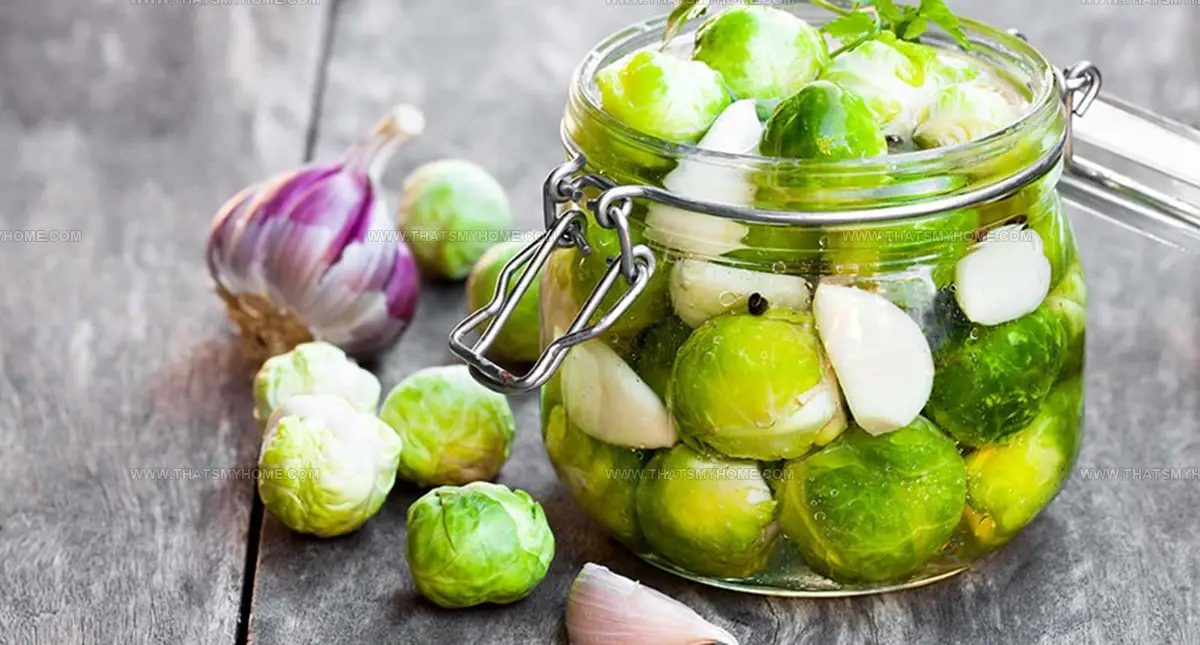
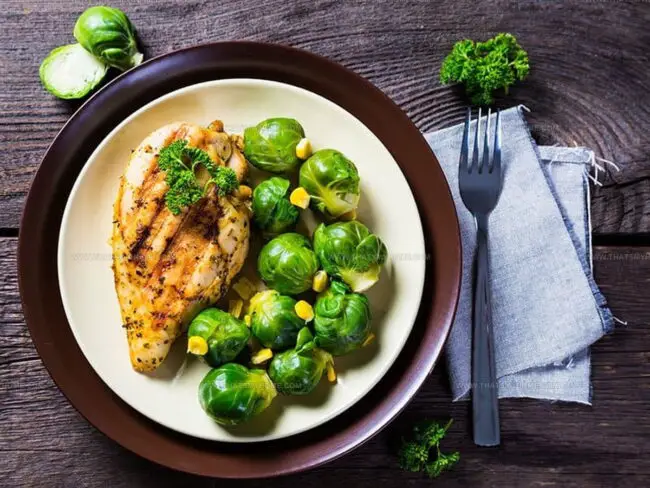
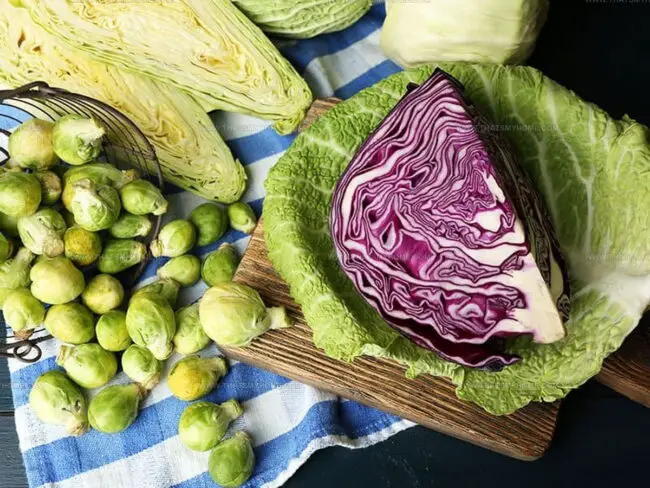
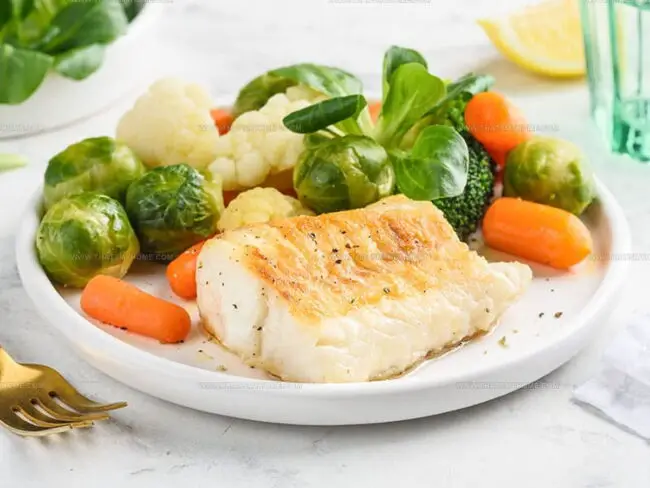
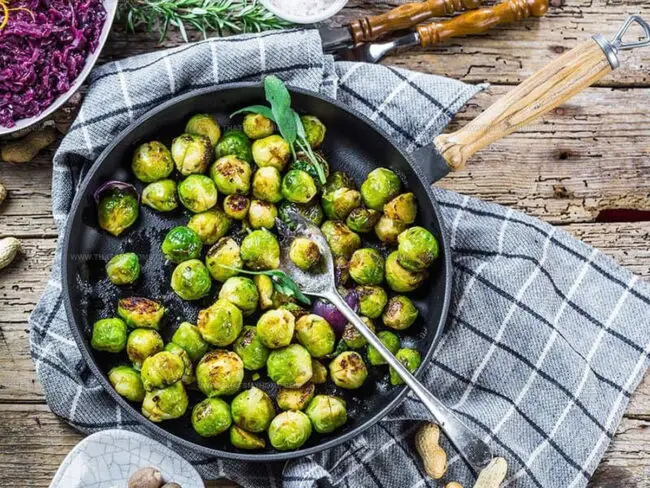
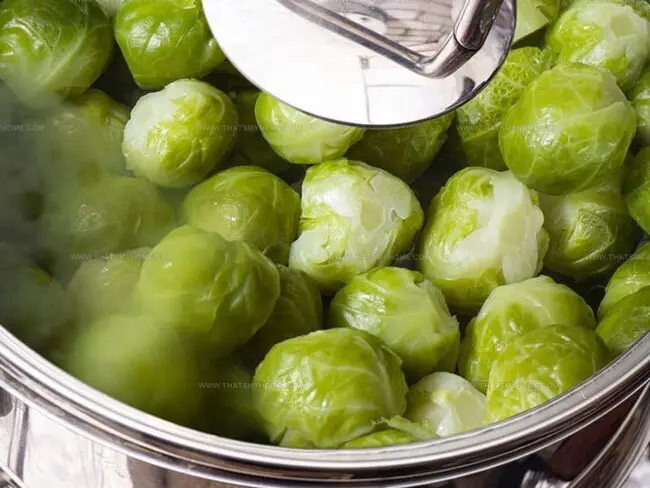
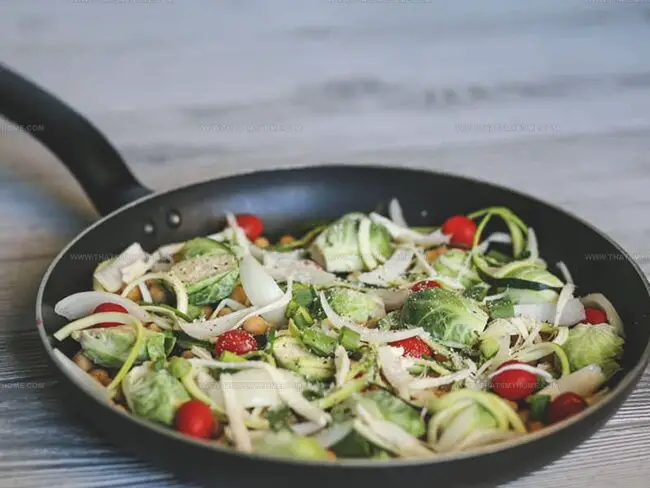
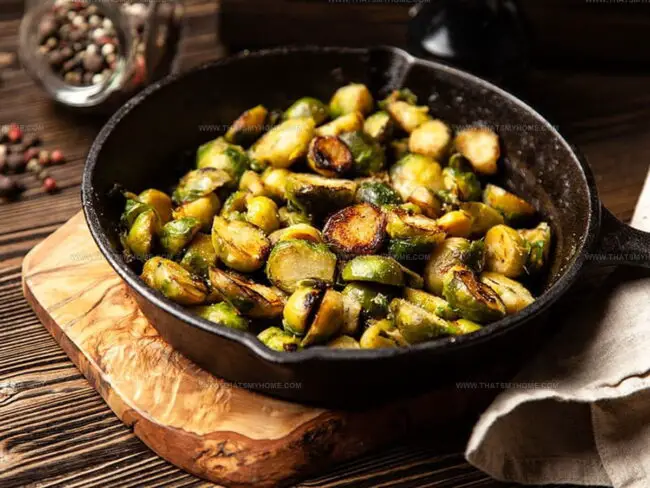
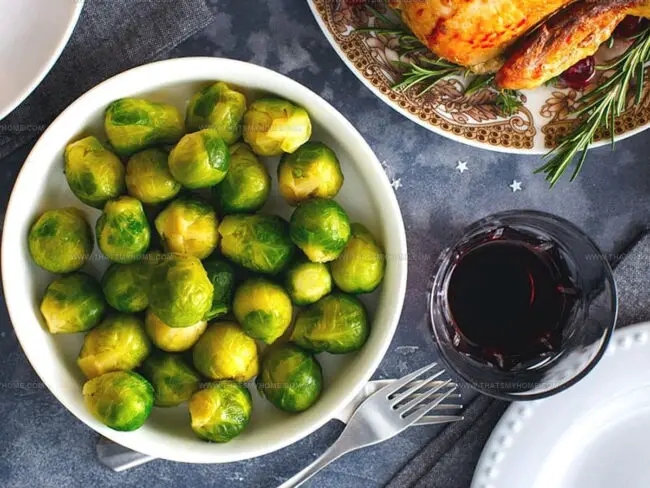
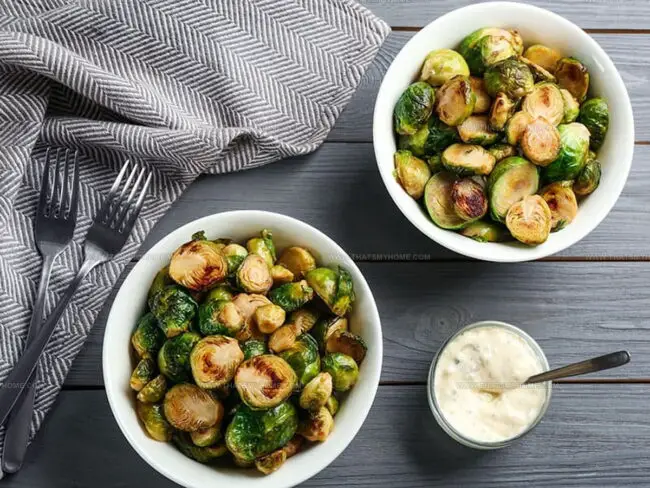
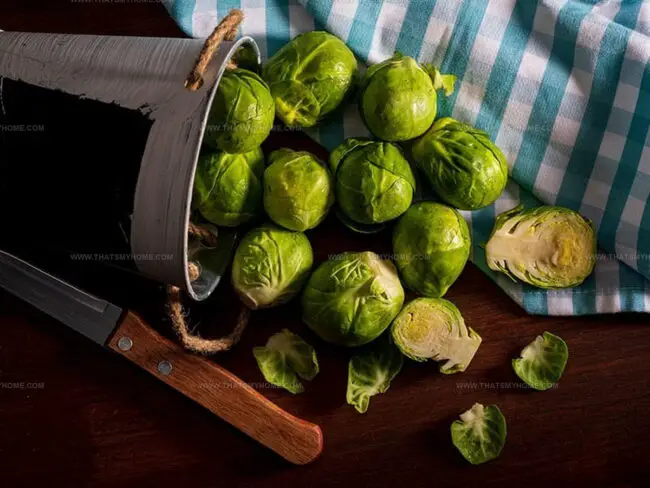
Mary Ellen
Expertise
Education